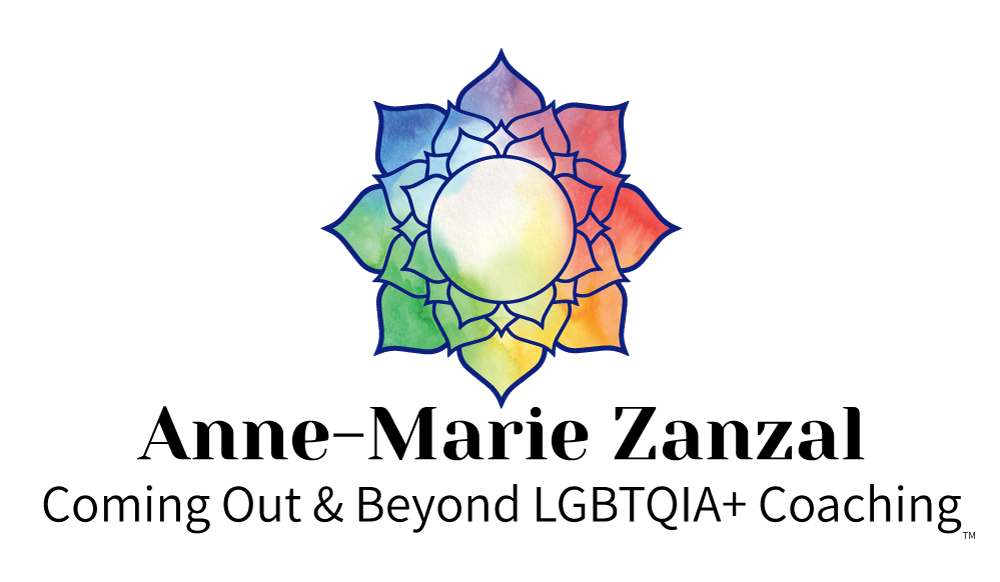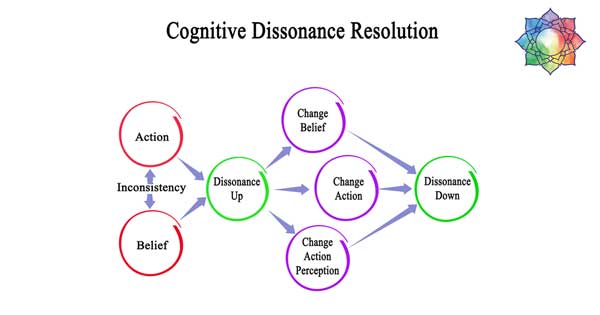What is Cognitive Dissonance?
In psychology, “The term cognitive dissonance is used to describe the mental discomfort that results from holding two conflicting beliefs, values, or attitudes. People tend to seek consistency in their attitudes and perceptions, so this conflict causes feelings of unease or discomfort. This inconsistency between what people believe and how they behave motivates people to engage in actions that will help minimize feelings of discomfort. People attempt to relieve this tension in different ways, such as by rejecting, explaining away, or avoiding new information.” Read More Here >
We have been conditioned with a series of beliefs often since childhood: That we should get married to a male, have babies, put our families needs above our own, be a “good” girl/wife/mother as fits the context of our moral or religious upbringing.
Yet we are getting competing messages that say: We may not be straight, we are attracted to women, we may not be happily married, why do our needs have to come last? We get messages that point to this possibility, but because they are in conflict with what we always believed, cognitive dissonance occurs and it can cause a fear response or make us feel like our brain is going haywire. Fortunately, cognitive dissonance is something all people deal with on a regular basis and learning to work through it in the context of coming out, especially later in life, is absolutely possible.
The discomfort and sometimes pain can be extreme when what we now believe, or who we are coming to understand we are, come in conflict with what we were conditioned to believe and uphold our entire lives. It’s not an easy mental fix.
A simple example: If you forget to brush your teeth one morning and brushing twice a day is important to you, you can move through it mentally by thinking, “well, I’ll brush an extra time at lunch instead” or “I’m usually so consistent one time won’t hurt,” and any cognitive dissonance about your values not matching your behaviors is eased. It isn’t that direct, or simple when it comes to your identity and living authentically.
Cognitive Dissonance About Queerness
Cognitive dissonance can arise from internalized homophobia and beliefs that we acquired over time about what is and isn’t “normal.” It’s never easy when you feel like you don’t fit society’s mold, and still feel the pressure to be what society expects. We are all human and want to be accepted and loved and we may fear we can’t be.
It’s also possible to experience this kind of dissonance when the myths and stereotypes we’ve heard about queerness don’t match up with personal experience. We wonder, “I don’t fit that, so can it even be true?”
Cognitive Dissonance About Identity
Many of us experience cognitive dissonance when our queerness doesn’t seem to match who we were or thought we would be; when it doesn’t fit with the version of ourselves in our heads. We can feel like we are having an identity crisis and don’t know how to proceed. Stuck between who we think we should be and who we are discovering we are can be very tricky to navigate. We put our suspicions on a shelf, ignore the evidence, and sometimes remain in denial about our sexuality and queer identity in order to keep our mind at ease by satisfying the “should” of who we think we’re supposed to be.
Sometimes we can also feel torn because parts of our identity seem so at conflict that we forget to see that each expression of who we are, is still part of who we are as a whole. Taking time to discover how to be and express yourself is part of navigating cognitive dissonance. This discovery can be uncomfortable but it often leads to clarity on how to be our authentic selves, and how to have happiness, and joy–even through conflict.
What about My Religious Beliefs?
Religious beliefs specifically can be especially difficult. Many of us grew up in religious communities with negative views of homosexuality and queerness. Cognitive dissonance occurs because undoing those beliefs can seem impossible. You can still be religious and a lesbian, but it will take some adjusting so you can live authentically while holding to whatever beliefs validate that part of you.
Also, you can keep any belief that aligns with your perspective. You are not required to throw out all of your beliefs at once, you can take your time to adjust and sort out what resonates with you.
Why does it seem so hard?
When our beliefs conflict with who we are, the mental gymnastics required to stay in those beliefs are exhausting and often traumatic, and changing them isn’t simple either. Especially coming out later in life, there are a lot of things that change, and shift. There is much to think about, process, and undo in some ways so much we rewrite our thought processes in order to live authentically and let go of that dissonance.
As much as we would like to try, we can’t make who we used to be and who we authentically want to be exist at the exact same time. We can’t stay in the in-between. We can’t live in denial about our unhappy marriages, our dissatisfaction with religion or culture, or our sexuality. At least not long-term.
Denying our worth, our personhood, and our true knowledge of self can have lasting damage. Doing something about cognitive dissonance requires attention and active choices and letting go of so much, but it is possible. Cognitive dissonance is part of the growing and learning experience that often empowers you to find a way to be you, and be you proudly. So give yourself some compassion as you sort through the many things you are processing.
How to get back into harmony
Working through cognitive dissonance involves rationalizing, changing beliefs, and/or making certain beliefs less important to you. Some of that won’t work easily when it’s about your identity. It is part of the journey, and it takes time, it requires consistent effort, but it is worth it to be able to live authentically. For most everyone it is safe to confront our sexuality. It’s safe to face who we are and what we want and take back our personhood. We can change our have control over your beliefs, actions, etc. Only you can change them. The way through is step-by-step. We can rewrite our brains if that is what we want, because of neuroplasticity.
Cognitive dissonance can be difficult to move through at the best of times, particularly when your sexual identity and future is in question, but you don’t have to do it alone.
Many times when we are coming out later in life, we are searching for someone to tell us what to do about this dissonance, and how to pick and choose the beliefs to keep. The good news is that you get to choose what you want those beliefs to be. You get to authentically and proudly be who you say you are, and that matters more than what anyone else has to say about you or who you “should” be. Only YOU can name your sexual or gender orientation.
This process, while it can be challenging at first, know that you can find your way, and there are many women who have come before you, who are here to rally behind you, and support you.
Cognitive Dissonance is Something We Live with Everyday
Cognitive dissonance is something that we face and confront everyday. It is not something that we can fix, or that we need to fix. The only way to resolve cognitive dissonance is to accept that things will be different, to accept that things are changing, accept the fact that you are gay, acceptthe fact that you may need to get divorced, accept that your beliefs will change over time, accept that the kids will change.
Acceptance here is the key regardless of what you are going through that has you feeling torn or at conflict. When you can accept that this change and shift is part of your life, that’s when the pain from cognitive dissonance can resolve.
Cognitive dissonance is not the only reason why coming out later in life is hard, and it does have a role and influence in our lives during this time, sometimes in bigger ways than usual. As we navigate our path and become more confident in who we truly are, we find our way to self-acceptance, and acceptance of the individual journeys we are on.
Looking for Support Through the Coming Out Process?
I have a variety of facebook groups that are private that make it easy to connect with other women and trans women who are on this journey. If you are looking for more one on one support, I provide individual coaching to help you navigate this dissonance. It’s my job to walk with you, to listen, and to give you the encouragement to be bold, and to live authentically.
I also have support groups that are usually topic focused, and these have anywhere from 8-12 participants. If you aren’t sure about where to start, feel free to book a discovery call with me, and we can talk more about where you are on your journey specifically.



Recent Comments